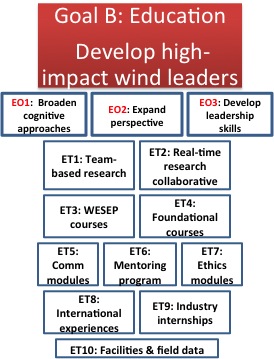 We will produce PhD graduates who will have significant impact on the wind energy community by accomplishing three education objectives, through an innovative model, which aims to transform graduate education at Iowa State University.
We will produce PhD graduates who will have significant impact on the wind energy community by accomplishing three education objectives, through an innovative model, which aims to transform graduate education at Iowa State University.
Education Objectives
EDUCATION OBJECTIVE 1: BROADEN COGNITIVE APPROACHES
The Real-Time Research Collaborative (RTRC) will serve as a forum through which we will demonstrate and observe what we collectively refer to as research. It will provide a team-based environment whereby students learn interdisciplinary thinking while performing the entire research cycle, producing submitted proposals and papers. WESEP faculty will expose the fellows to cognitive approaches used in each discipline, i.e., how individuals conceptualize research problems and go about generating knowledge. This work grows from the perspectives that (a) different disciplines lack awareness of each other’s cognitive approaches; (b) there are significant differences among disciplines in terms of approaching problems; and (c) recognizing that different cognitive approaches enhances students’ awareness of the value of synergy resulting from complementary strengths across disciplines. Our interest extends beyond articulated formal research processes (e.g., the scientific method of problem definition, literature search, hypothesizing, testing, analysis and conclusion, and reporting) into an in-depth exploration of what actually occurs in generating knowledge.
EDUCATION OBJECTIVE 2: EXPAND PERSPECTIVE
Effective leaders in the wind energy community will need to have a broad perspective to address wind energy challenges. Our program will broaden students’ academic exposure via three distinct types of experiences: interdisciplinary, industry, and international. The interdisciplinary features of our program will promote systems thinking with an array of interdisciplinary skills rooted in agronomy, agriculture, economics, environmental science, mesoscale wind dynamics, sociology, aerodynamics, materials, multibody dynamics, structures, electric machines, power electronics, power systems, manufacturing, supply chain and logistics, optimization, reliability, statistics, and nondestructive evaluation (the expertise of project faculty cover the span of these proficiencies). These topics will be reinforced by hands-on experience with hardware and field data via: (a) access to one or more of ten wind plants near Ames; (b) wind turbine data from one or more of five large wind plant owners in Iowa; (c) developing Iowa State-owned turbines near campus; (d) access to manufacturers; (e) coursework activities in on-site labs, including the Aerodynamic/Atmospheric Boundary Layer Wind and Gust Tunnel, Alternative Energy Grid Infrastructure Systems (AEGIS) Laboratory, and Wind Energy Manufacturing Laboratory. We will use a three-level curriculum structure, the RTRC, and team-based research projects to provide a foundation of interdisciplinary skills and knowledge for career-long learning and problem solving. Research teams of 3-4 students and their supervising faculty will address a research objective that corresponds with the students’ objectives. The industrial features of our program will include strong interaction with industry and national labs via our Project Advisory Board (PAB), as well as a 3-6 month internship. The international features of our program will include a 3+ month visit to one of our international partners. The internship and the international experience will provide practical applications for students’ research without extending their time-to-degree since students will be able to continue work on their dissertation topics. The PAB will be involved in matching students to companies. Co-PI Lisa Brasche is highly experienced in industry and international relations and will coordinate, manage, and monitor these activities with input from the PAB. Lastly, we have partnered with four Iowa State research centers that have committed to providing financial support for one additional student each over five years.
EDUCATION OBJECTIVE 3: DEVELOP LEADERSHIP SKILLS
All students will participate in a 4-module ethics, communication, and leadership course, “Professional Practices in Wind Energy,” to be designed and taught by journalism professor and communication expert Lulu Rodriguez and Iowa State University philosophy professor and ethicist Clark Wolf, along with PI James D. McCalley, who lectures on ethics in his department’s senior design course, and co-PI Eugene S. Takle, who addresses ethical issues of global environmental change in his courses and as faculty director of the University Honors Program. The modules will be offered to IGERT fellows during a two-day retreat each year, supplemented by dedicating at least two RTRC classes per semester to these issues. These activities are central to the project’s vision because high wind penetration will lead to complex human interactions between landowners and land managers, manufacturers, utilities, regulators, policy-makers, and non-government organizations.
